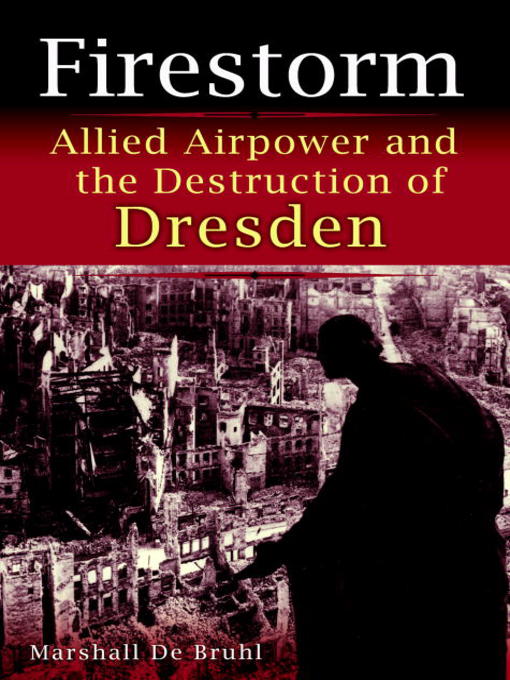
Firestorm
Allied Airpower and the Destruction of Dresden
کتاب های مرتبط
- اطلاعات
- نقد و بررسی
- دیدگاه کاربران
نقد و بررسی

October 9, 2006
De Bruhl puts his experience as a book editor to good use in this narrative of the still-controversial bombing of Dresden in 1945. Making comprehensive, sophisticated use of archival records and published sources, De Bruhl reminds readers that although Dresden's museums, churches and porcelain factories made it one of Germany's loveliest cities, there was still a war on when Allied bombers targeted the manufacturing and communications center for the Nazi war machine. Recognizing what he calls "the fatal escalation" of the air war against German civilians, De Bruhl also demonstrates the time, effort and blood it cost to establish air superiority over Germany. He establishes the determination of the Third Reich's leaders to continue the war at all costs—a demand the German people accepted. He also examines the often-overlooked V-Weapons campaign mounted against Britain in June 1944, which silenced those Britons who questioned mass bombing of civilians. Certainly neither the British nor the American air forces had any compunction at mounting the raid De Bruhl describes as "theory put into flawless practice." When the last bombers left, Dresden was no longer a major producer of armaments. In a war begun by Germany, that was—and is—the bottom line.

December 1, 2006
From 1940 onward, the Allies bombed Germany and the occupied countries as thoroughly as they could manage. Precision bombing, area bombing, terror bombing, revenge bombing, day and night bombing, strategic bombingby the end of the war, the great cities of the Reich were in ruins. Berlin-based author Friedrich examines at length and with great intelligence the origins and conduct of the air war against Germany. He analyzes which methods were successful, why the Allies chose to prosecute the war primarily through the bombing campaign, what the relationship was between German culture and the Third Reich, and what effect this bombardment had on postwar morality in Germany. Friedrich has written not so much a lamentalthough grief is certainly powerfully presentas an indictment both of Hitler's appropriation of German history and of the Allies' destruction of a nation's culture. Thoughtful and detailed, his book also examines the very science of fire and the evolving methods of destruction that by 1944 were quite capable of wiping out a city overnight and overwhelming its welfare apparatus with refugees.
De Bruhl ("Sword of San Jacinto: A Life of Sam Houston"), a former U.S. publishing executive and editor, also looks at Allied weapons but with much less insight, largely focusing on their flaws. He also discusses the conduct of the air war and makes no bones about attacking the main architects of strategic bombing, such as Hugh Trenchard of the Royal Air Force and American Gen. Carl Spaatz. However, his treatment of the aftermath of the war and the debates that arose among the participants is missing from Friedrich's work and provides valuable context. The two books are somewhat complementary, but Friedrich's, already a big seller in Europe, is a superior essay on the real issues of warwhat is just, what is permissible, what is necessary. Subject collections will desire both books but are likely to prefer Friedrich's.Edwin B. Burgess, U.S. Army Combined Arms Research Lib., Fort Leavenworth, KS
Copyright 2006 Library Journal, LLC Used with permission.

October 15, 2006
A comparison of Frederick Taylor's " Dresden" (2004) to this new history reveals the benefits of acquiring both titles. Dresden, Taylor makes plain, the city synonymous with -baroque music and architecture, was also a city of ardent Nazis and arms factories. Taylor, a specialist on the Nazi period, is better at depicting the city's political and military attributes, which defenders of the air raids seize upon. De Bruhl proves to be strong on the Anglo-American strategy of strategic bombing in World War II, personified by Arthur "Bomber" Harris, commander of the British effort. Harris did not have scruples about solving the inaccuracy of their airpower by bombing the whole area. De Bruhl underscores that Harris was not a loose cannon, and casts the actual Dresden attack as a culmination of the air war. One of WWII's most controversial military actions, Dresden and the debate about it can't be grasped without considering the arguments of both titles.(Reprinted with permission of Booklist, copyright 2006, American Library Association.)

























دیدگاه کاربران